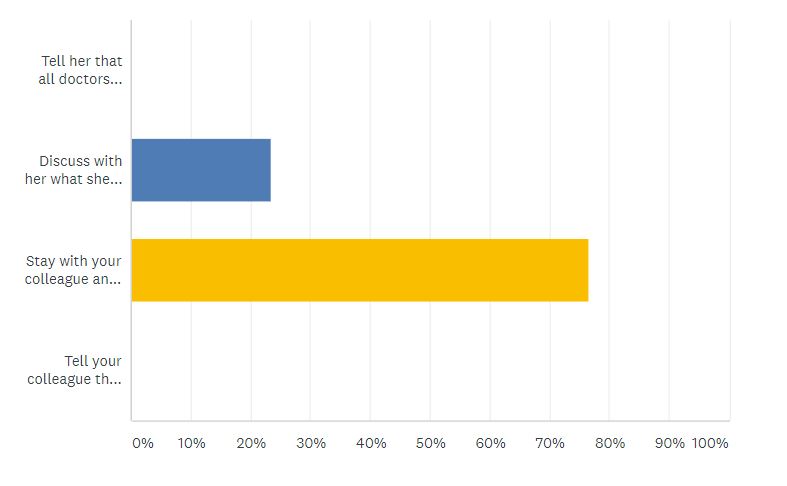September Question:
In September, our issue was focused on Suicide Awareness Month. Let’s review:
Note from the Editors-in-Chief: September was Suicide Awareness Month. As such, this issue’s question was themed around physician suicide, an issue which already has or will likely affect all physicians. If you or a friend is struggling and considering self-harm or suicide, please contact your program director, Student Affairs, a mental health provider, or another trained professional. The National Suicide Prevention Lifeline is available 24 hours per day, seven days per week: 1-800-273-8255.
You are working an overnight shift with one of your colleagues when a code blue is announced overhead. After a long and arduous code, the decision is made to withdraw care. Afterwards, you and your fellow resident are sitting in the call room, both exhausted. Your colleague tells you that she had been working with this patient for weeks, and that the team thought the patient was finally turning the corner. She tells you that being in medicine might not be worth it. She also tells you she isn’t sure whether she wants to live, when she can’t even save her patients. You are very distressed by her response and you aren’t sure how to react. What do you do?
- Tell her that all doctors have patient deaths. She needs to sleep it off and reevaluate in the morning.
- Discuss with her what she means when she says she doesn’t want to live. If she is suicidal, give her the number for a 24 hour hotline and leave so that she can have some privacy.
- Stay with your colleague and contact your program director for support. He/she may know specific resources to help your fellow resident.
- Tell your colleague that you have had similar feelings before, but that you’re able to get over it. She needs to learn how to deal with a patient death without falling apart.

Responses to this question were split between two answers. Some responders decided it would be best to give the colleague a hotline for suicide prevention, which is a great resource. A majority of respondents decided to stay with their colleague and notify the program director, who may be able to provide further assistance. No respondents chose to brush the issue off. As recognized by respondents, it is important to provide support to a colleague having suicidal thoughts or ideation. Please reference your program’s resources for suicide, or use the national resources mentioned above.
November Question:
You are working on an interdisciplinary team between the obstetrician and neonatologist and supporting staff for a high risk pregnancy and delivery given the concern for late preterm delivery. Everything progresses normally until the delivery, when the infant suddenly dies and cannot be resuscitated. You have discussed the plan for delivery but never the possibility the infant could die. After a grieving period 28 hours after the delivery, the family requests to donate the infant’s body for medical research or organ donation to benefit others, having never expressed such wishes prior. Unfortunately, you are unclear on the protocol regarding either topic.
Given the sudden unexpected nature of the infants death, how would you have counseled the patient regarding their options?
- Discussed the possibility of infant demise or sudden infant death prior to delivery and discussed the donation options as part of regular prenatal care even with minimal concern, with preparation for donation if this progresses
- Approach the family after the delivery within the window of time that neonatal organ donation can be achieved to discuss the options available regardless of their wishes
- Call donation centers at 28 hours when the request is made for scientific and research donation and inquire into hospital protocol on the practice
- Never discuss prior nor after as since the parents wishes could not have been achieved regardless as it is more benevolent to allow the family to feel the second loss in being unable to serve the “greater good”
Tell us what you think!
Alexandra Cooke is a medical student at The University of Arizona College of Medicine – Phoenix. She graduated in 2013 from UA with bachelor's degrees in physiology and international studies. This self-proclaimed global health nerd and news junkie can commonly be found downtown exploring local coffee shops and bookstores or out dancing ballroom or swing with friends. In the future, Alexandra hopes to incorporate her passions (somehow) into her medical career and be able to empower patients. She is one of the co-chairs of the Medical Ethics Interest Group.

